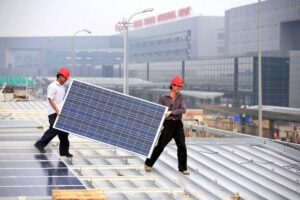A massive hybrid renewable energy and green hydrogen project being developed to replace outgoing Victorian coal generation has won the backing of the Clean Energy Finance Corporation and one of Australia’s leading superannuation funds, Hostplus.
The CEFC said on Tuesday that and Hostplus would invest in the Gippsland Renewable Energy Park (GREP) – a project that will start with 500MW of solar and 500MWh of battery storage – via a joint venture platform being managed by Octopus Australia.
The federal government’s green bank is tipping in $8.5 million in the project, which was initially developed by Solis RE on a 3,000 hectare site at the heart of Victoria’s proposed Gippsland Renewable Energy Zone, in the heart of Victorian coal country.
The massive project – which is now being developed by the CEFC Octopus JV – was first proposed in 2019, as a way to “fill the gap that will be created from the phasing out of the existing coal fired power stations, which will be much sooner than initially planned,” as Solis RE put it, then.
The Solis project website said that the initial development of solar plus battery storage would co-exist with continued sheep grazing at the site, the majority of which is owned by the local Ferguson family.
Green hydrogen and other renewables, including wind turbines, would then be considered for Stage 2 of the project – with the aim of getting it up and running in time to assist with the early closure of Yallourn.
EnergyAustralia announced in March of last year that it would close the Yallourn coal-fired power station in 2028, four years earlier than had been previously planned. Just a few months later, in June, the plant was forced to close three out of four of its units, after floods in Victoria seriously compromised the adjoining coal mine.
In a statement to RE on Tuesday, Solis Gippsland Projects – which is 50% owned by Solis RE and 25% by Gippsland local business Marathon Group and 25% by the Ferguson family – confirmed that it had sold the development rights to GREP to the CEFC and Octopus JV, which had since attracted the funding from Hostplus.
“Gippsland has been a powerhouse for the National Electricity Market for many years. This development will contribute to the region’s transition to a clean energy future, while continuing to supply the power that helps keep Australia’s lights on,” said CEFC CEO Ian Learmonth in comments this week.
“With the planned construction of both solar and storage at the site, the GREP also offers an exciting opportunity for the Gippsland community to benefit from the clean energy economy.
“We are delighted that Hostplus has come on board, building its future green investment pipeline on behalf of its diverse 1.4 million members, and delivering on the CEFC commitment to attract private sector capital to renewable energy developments.”
For Hostplus, the decision to back the GREP project comes as the super fund announces a commitment to net zero emissions by 2050, in line with Australia’s commitment to the Paris Agreement.
“Climate change represents a significant financial risk to global markets and economies over the longer term,” said Hostplus CEO David Elia in a separate statement on Tuesday.
“We have a responsibility to protect our members’ retirement savings and deliver them the best financial outcomes, so it is important that we take further action now to ensure the investment portfolio remains well-positioned as the world adapts to a lower-carbon future.
“We also believe that a net zero emissions commitment will present further investment opportunities in new technologies with strong growth potential.
“As a significant investor in new technologies via our venture capital and infrastructure portfolios, we’re already contributing to the development of the technologies that will enable and empower an orderly transition and which will also deliver additional value for our members.”
“We have undertaken considerable analysis to ascertain the key contributors to portfolio emissions and are developing a roadmap for how to prioritise our emission reduction activities,” Elia said.
Octopus, which entered the Australian market more than four years ago as a subsidiary of the UK-based Octopus Group, manages more than $1 billion in assets under construction and operations on behalf of its investors.
Octopus Australia managing director Sam Reynolds said on Tuesday that it was encouraging to work with such well respected partners in bringing the GREP project to life.
“It is a great opportunity to combine the resources and capital of each group into a collaboration that can build GREP in a way that benefits not only Australia’s clean energy future but equally as importantly, the local Gippsland community,” he said.
Octopus Australia says that construction and development of the GREP will generate an estimated several hundred jobs in the region, which was hit hard by bushfires over the 2019-2020 Black Summer and faces the decline of local industries including timber and coal-based generation.










